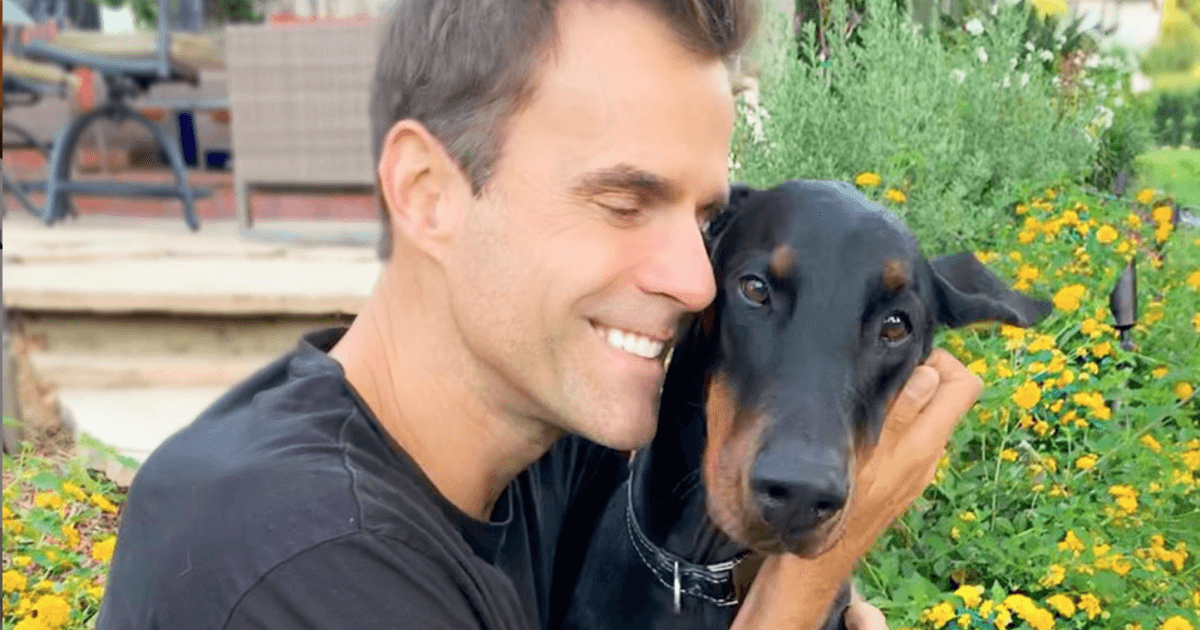For a lot of people going through cancer, pets can be a really important part of recovering emotionally from the disease, and Cameron Mathison, 50, who starred as Ryan Lavery on the soap opera "All My Children" for many years, is one of them.
When it comes to pet therapy, SurvivorNet has spoken with a number of people who say that it’s helped them through very difficult times. One of them, a bone cancer survivor named Richard Marks, talked to us about pet therapy, and how it can be beneficial for people grieving, people going through treatment, and the pets themselves!
Read MoreRichard's pet therapy was courtesy of The Good Dog Foundation which is an organization that promotes recovery from trauma and stress using animal-assisted therapy services. In Richard's case, he spent his chemotherapy days with a rescue dog named Bowie. Sarah Conroy, Bowie's owner, became certified to visit hospitals with her pooch through the Good Dog Foundations. She told SurvivorNet that Bowie loves visiting his friends in the hospital, but for him "It's more about getting pet messages."
Alison Snow, who works in cancer support services at Mount Sinai, told SurvivorNet that there is research to show that the animal visits to hospitals can be super beneficial to people battling cancer, as well as other ailments.
"You can hear the excitement in the air when the dog is around and there is research to show that having animal-assisted visits is helpful to patients going through cancer in terms of lowering blood pressure, reducing anxiety, decreasing depression, and overall, helping patients feel less isolated," she said.
Cameron Mathison and pet therapy during cancer
Mathison first announced he had kidney cancer on The Hallmark Network, and then revealed the diagnosis on Instagram less than a month ago. From there, he and his doctors have moved quickly into treatment, and Mathison reported that he had a “partial nephrectomy,” which means that doctors removed part of his kidney in order to treat his disease. After his surgery, Mathison posted about his pet doberman Red, and how he is helping him cope during this difficult time.
RELATED: Pet Therapy Can Really Help During Cancer Treatment: "It Takes Me Out of My World"
In an Instagram post earlier today, Mathison wrote “Pet therapy at its finest #youremyboyred #pettherapy #feelingsomuchbetter #dogsofinstagram,” alongside a photo of himself hugging his pup. Using the hashtag #feelingsomuchbetter, he seems to be saying that his doberman is helping him through, and that after his treatment, he’s feeling alright.
View this post on Instagram
Pet therapy at its finest???????? #youremyboyred #pettherapy #feelingsomuchbetter #dogsofinstagram
And supporters commented to let Cameron know they totally agree that pets are good for the soul, and that they are glad he’s doing a little bit better.
“They do the heart good!!”
“I'm glad you are healing well [heart]”
“Have a blessed day, Cameron!”
He also posted a photo to his ski-themed Instagram story of his pup during a ski vacation, writing in the dog’s voice, “What’s all this white stuff?” and using the hashtag #socialdog.

It’s clear that no matter where Mathison is and what he’s doing, his pet is a huge part of his life, and gives him a lot of joy during his cancer journey.
Mathison’s cancer journey
After initially announcing his diagnosis on TV, Mathison wrote an emotional Instagram post to let his followers know what was happening with his health.
“I have a health situation that I want to share with you all [prayer emoji]. There are many reasons I love social media, staying connected with you all, sharing fun experiences… well this time I'm asking for your help,” he wrote int he post alongside a photo of him with his wife, Vanessa, and two children, Leila and Lucas.
In a more recent post, Mathison wrote,”Unbelievably grateful to be back home after a successful partial nephrectomy surgery. It was an eventful 4 days in the hospital, and doing well at home now. @inderbirgillmd is a miracle worker, and my whole family is indebted to him and everyone at @keckmedofusc [prayer emojis],” alongside a photo of himself holding a photograph framed with poster and signed with lots of loving wishes, and surrounded by gifts, flowers and comforting objects.
He also talked about how much it means to him to have so much positive energy around him during this time, “Thank you to everyone sending prayers, positive thoughts, flowers, cards, stuffed animals, food, love[heart emoji]… and kidney beans[laughing emoji] Love you guys[loving emoji]#1.8kidneysleft #cancersucks #cancerfighter #feelingloved.”
Mathison said his surgery was performed at USC, which is a major, high volume cancer center in Los Angeles.
And his supporters commented their praise of his attitude, and sent their love his way, “You are a WARRIOR! We are here for you every step of the way [hearts] sending love and light and strength.”
“Aw how sweet is this? You’ll be back to normal in no time, Cameron. Blessings, love, speedy healing, & loads of prayers & good thoughts sent your way! Always!”
Mathison also posted a photo of himself in a hospital bed with his two kids on either side of him, holding his hands. He expressed his gratitude for their love and support, “Feeling loved and supported by my family and friends, including each and everyone of you. I've been very overwhelmed and so grateful for all of the supportive comments and prayers.”
And offered a few more details as to the details of his surgery, “The surgery went very well. The tumor is gone and I even got to keep 80% of my kidney[smile emoji] We are all optimistic. Keep you updated. So grateful for all of you [heart emoji].”
Supporters responded by offering words of kindness and hope, “That is awesome news so glad to hear keep positive and hope you have a speedy recover and your not in to much discomfort [heart].”
“I’m so thankful your surgery went well. I’m continuing to pray for a speedy recovery. I’ve just started watching the Hallmark channel and love seeing you in each and everyone of the movies. God bless you!! [hearts]”
Information and treatment options for kidney cancer
Kidney cancer can develop in adults or children. There are two main types of kidney cancer that occur in adults: renal cell cancer, and transitional cell cancer, according to the National Cancer Institute.
Renal cell cancer is a disease in which malignant (cancer) cells form in tubules of the kidney. Smoking and misuse of certain pain medicines can affect the risk of renal cell cancer. Signs of renal cell cancer include blood in the urine and a lump in the abdomen. Other signs of the disease may include pain in the side that doesn't go away, loss of appetite, weight loss for no known reason, and anemia.
Treatment for renal cell kidney cancer usually includes some combination surgery, radiation therapy, chemotherapy, immunotherapy, and targeted therapy.
For renal cell cancer, surgery is a common treatment practice. Types of surgery include:
- Partial nephrectomy, a procedure to remove the cancer within the kidney and some of the tissue around it.
- A partial nephrectomy may be done to prevent loss of kidney function when the other kidney is damaged or has already been removed.
- Simple nephrectomy, a surgical procedure to remove the kidney only.
- Radical nephrectomy, a surgical procedure to remove the kidney, the adrenal gland, surrounding tissue, and, usually, nearby lymph nodes.
Transitional cell cancer of the renal pelvis and ureter is a disease in which malignant (cancer) cells form in the renal pelvis and ureter. A personal history of bladder cancer and smoking can affect the risk of transitional cell cancer of the renal pelvis and ureter. Signs and symptoms of transitional cell cancer of the renal pelvis and ureter include blood in the urine and back pain.
Kidney and renal cell pelvic cancers make up about 4.2 percent of all new cancer cases per year in the U.S., with and estimated 73,820 in 2019. These cancers account for about 2.4 percent of deaths from cancer in the U.S. with an estimated 14,770 deaths from this cancer in 2019. The five year survival rate for kidney and renal pelvis cancer is about 74.5 percent.
Learn more about SurvivorNet's rigorous medical review process.

